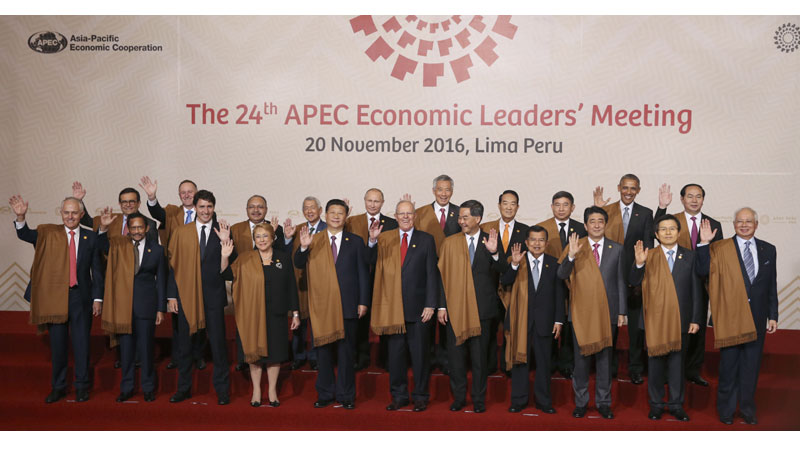
Leaders of Asia Pacific Economic Cooperation, APEC, wave during the group photo in Lima, Peru, Sunday, Nov. 20, 2016. Front row, from left: Australia’s Prime Minister Malcolm Turnbull, Brunei’s Sultan Hassanal Bolkiah, Canada’s Prime Minister Justin Trudeau, Chile’s President Michelle Bachelet, China’s President Xi Jinping, Peru’s President Pedro Kuczynski, Hong Kong’s Chief Executive Leung Chun-ying, Indonesia’s Vice President Jusuf Kalla, Japan’s Prime Minister Shinzo Abe, South Korea’s Prime Minister Hwang Kyo-ahn and Malaysia’s Prime Minister Najib Razak. Back row, from left: Mexico’s Secretary of Economy Ildefonso Guajardo, New Zealand’s Prime Minister John Key, Papua New Guinea’s Prime Minister Peter O’Neill, Philippines’s Secretary of Department of Foreign Affairs Perfecto Yasay, Russia’s President Vladimir Putin, Singapore’s Prime Minister Lee Hsien Loong, Taiwan ‘s special APEC envoy James Soong, Thailand’s Deputy Prime Minister Prajin Juntong, US President Barack Obama and Vietnam’s President Tran Dai Quang. (AP Photo/Martin Mejia)
LIMA, PERU—Leaders of 21 Asia-Pacific nations ended their annual summit on Sunday with a call to resist protectionism even as more countries looked forward to joining a China-led trading bloc after Donald Trump’s election victory raised fears the United States would scrap free trade deals.
The Asia-Pacific Economic Cooperation forum closed with a joint pledge to work toward a sweeping new free trade agreement that would include all 21 Asia-Pacific Economic Cooperation (Apec) members as a path to “sustainable, balanced and inclusive growth,” despite the political climate.
“We reaffirm our commitment to keep our markets open and to fight against all forms of protectionism,” the leaders of the Apec nations said in a joint statement.
Apec noted the “rising skepticism over trade” amid an uneven recovery since the financial crisis and said that “the benefits of trade and open markets need to be communicated to the wider public more effectively, emphasizing how trade promotes innovation, employment and higher living standards.”
Frustration over globalization
Speaking to journalists at the conclusion of the summit, Peruvian President Pedro Pablo Kuczynski said the main obstacle to free trade agreements in Asia and around the world was the frustration felt by those left behind by globalization.
“Protectionism in reality is a reflection of tough economic conditions,” said Kuczynski, the meeting’s host.
Referring to Britain’s vote to leave the European Union and Trump’s election win in the United States, he said those results highlighted the backlash against globalization in former industrial regions in America and Britain that contrasted with support for trade in more prosperous urban areas and developing countries.
“This is an important point in recent economic history because of the outcome of various elections in very important countries that have reflected an antitrade, anti-openness feeling,” he said.
TPP pact in limbo
This was the last international summit for US President Barack Obama and he had been expected to promote the Trans-Pacific Partnership (TPP) pact, a 12-nation trade deal.
But Obama is no longer expected to seek ratification by Congress before he leaves office because of the election victory by Trump, who called the agreement a “disaster” for jobs.
Obama told reporters that the way to address income inequality and to create jobs was through crafting trade policy and agreements like the TPP in ways that would increase exports to the Pacific Rim countries that make up a third of the world’s population.
“When it comes to trade, I believe the answer is not to pull back,” he said at his last overseas news conference.
“The answer is to do trade right, making sure it has strong labor standards, strong environmental standards—that it addresses ways in which workers and ordinary people can benefit rather than be harmed by global trade,” he added.
Anxious world leaders
Questions about Trump trailed Obama throughout the trip as anxious world leaders quizzed him on Trump’s stances on key issues like trade, foreign policy and the Nato alliance.
On his final day in Peru, Obama sought to reassure the leaders gathered here that their long-standing ties with the United States wouldn’t falter under Trump.
Leaders of other nations said at the Apec meeting that they might seek to modify the TPP deal to make it more appealing to Trump or seek to implement it without the United States.
China deal favored
Even so, the statement issued at the close of the summit said Apec would also work toward adoption of a broader 21-nation pact favored by the Chinese government.
China, which is not part of the TPP, has been pushing an alternative vision of free trade in Asia under the so-called Regional Comprehensive Economic Partnership (RCEP), which does not currently include countries in the Americas.
Tan Jian, a senior member of China’s delegation at the summit, said more countries were now seeking to join its 16-member bloc, including Peru and Chile, and that current members want to reach a deal as soon as possible to counter rising protectionism.
In a final declaration, Apec leaders said the TPP and RCEP were both valid paths to a broader Free Trade Area of the Asia-Pacific, which has long been a goal of the Apec bloc that accounts for 57 percent of the world economy.
“We encourage that all regional undertakings, including TPP and RCEP, remain open, transparent and inclusive and draw on each other,” they said.
Canadian Prime Minister Justin Trudeau said he was keeping an open mind about Trump, who has threatened to tear up the North American Free Trade Agreement between his country, the United States and Mexico.
“We’re not going to jump to any conclusion about what the incoming American administration is going to actually do,” Trudeau said. —REPORTS FROM THE WIRES
RELATED VIDEO
[ventuno id=’ODUzODA5fHwyMzY4fHwxMDg2fHwxLDIsMQ==’][/ventuno]

